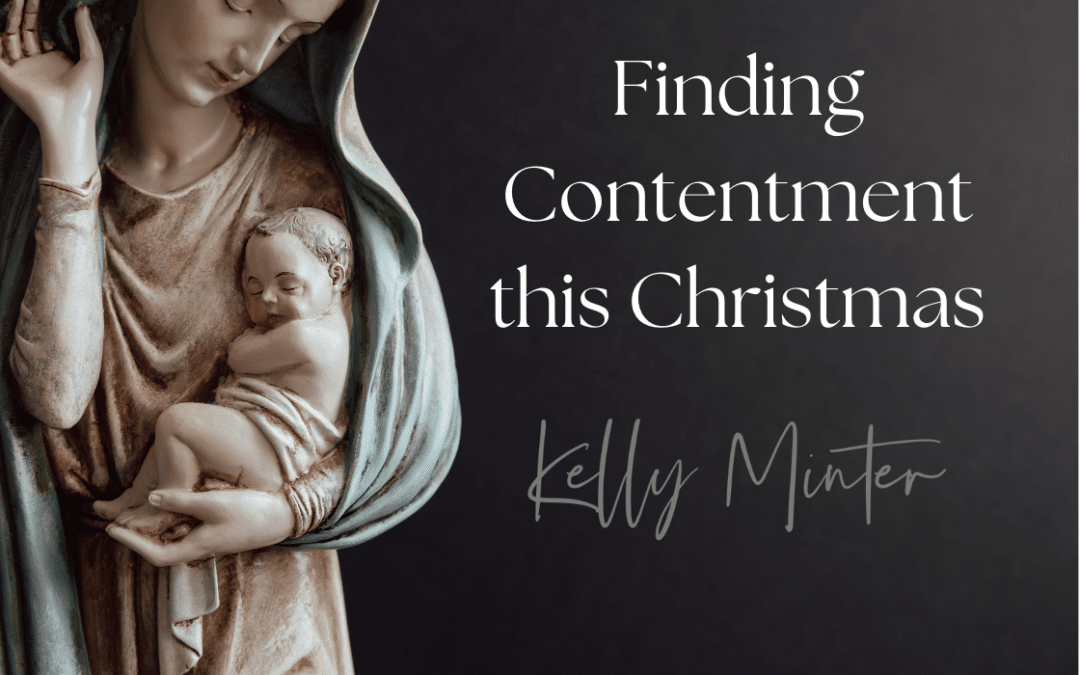
Finding Contentment This Christmas
This month I wanted to encourage you with how Elizabeth and Mary embraced their God-given roles and found joy leading up to the first Christmas.

This month I wanted to encourage you with how Elizabeth and Mary embraced their God-given roles and found joy leading up to the first Christmas.
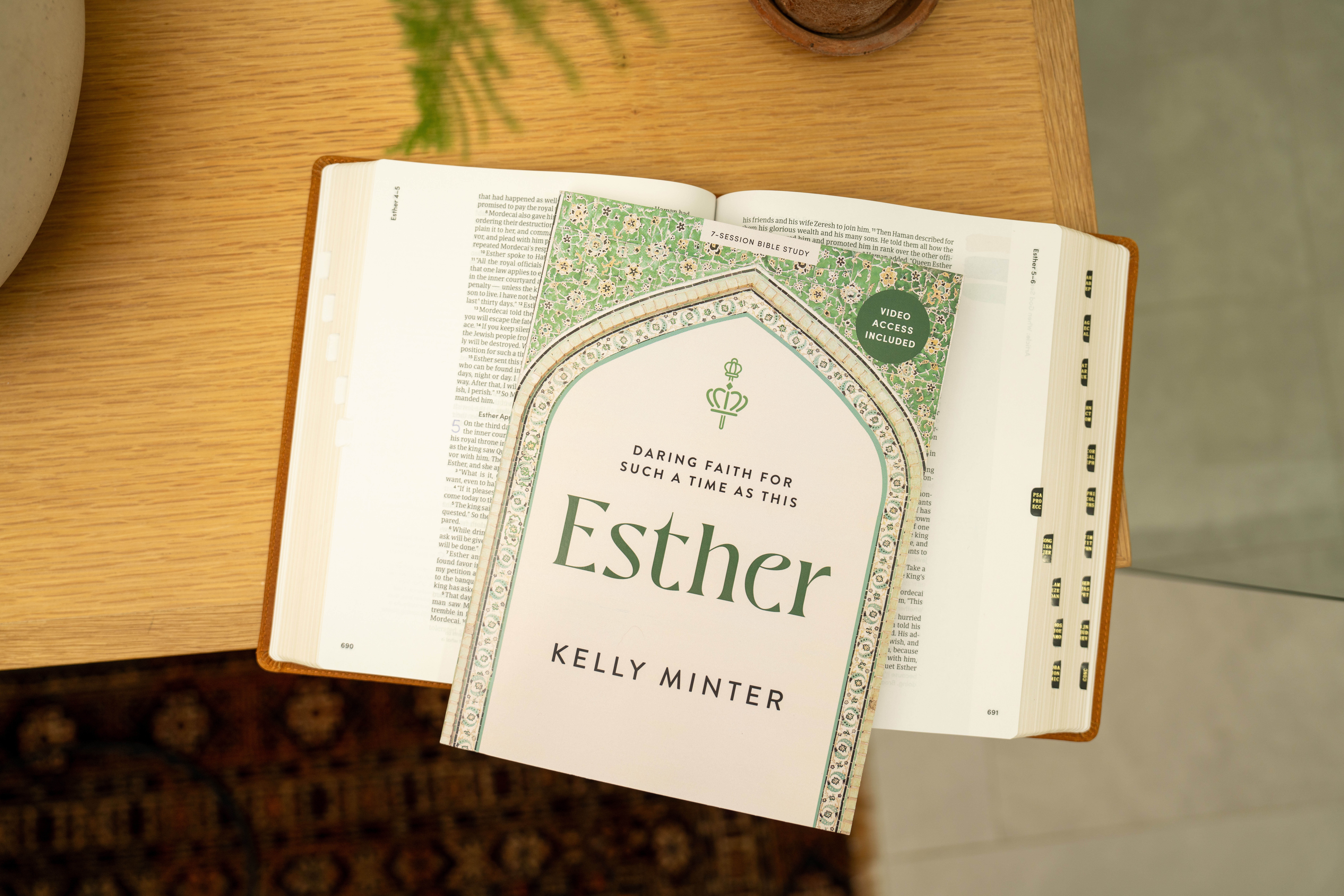
Over the next few months I’ll be writing devotionals from the book of Esther in celebration of the release of my latest study, Esther: Daring Faith For Such A Time As This, coming November 1st. There’s so much encouragement in her story. In God’s story.
When You Don’t Know, Do What You Do Know
Esther 4:14b “Who knows, perhaps you have come to your royal position for such a time as this.”
The phrase, “for such a time as this” is a familiar one in the Book of Esther. What we don’t often focus on is that the verse begins with “who knows.” Because we typically want to know, right? We want to know who our child will end up marrying, what will happen with the diagnosis, whether or not we’ll get the job, what school our child belongs in. We love a “thus sayeth the Lord,” when it comes to life’s biggest decisions.
But when Mordecai pleaded with Esther to put her life on the line on behalf of the Jewish people he didn’t have a direct command from the Lord. Mordecai believed that God would work out deliverance, but he didn’t know how. When it comes to significant outcomes in my life, I very much like to know “that” it will happen and “how.” But it’s precisely the latter that God doesn’t usually share with us. Sometimes all He asks us to do is to take the first step of obedience. And then the next.
As I write, I have a stirring in my heart for something I’m not quite sure about. The Lord has asked me to take a practical step of obedience but I don’t know where it’s leading. It it leads where it could, it would be life-changing. But the path could also just as realistically not be life-changing at all. Who knows? But here’s the thing… well, two things: 1. God knows all things and 2. we know a few things.
God knew exactly how He would deliver His people because He knows all things. But Mordecai knew a few things. We can assume he knew of God’s general will for His people, the Jews. We can assume he knew of passages like Deuteronomy 4:31 which says, “For the LORD your God is a merciful God; he will not abandon or destroy you or forget the covenant with your ancestors, which he confirmed to them by oath.” In other words, Mordecai knew that God would keep His covenant with His people even when they had been driven into faraway places. He knew enough to know that God would not fail the Jewish people now. Even though they were seemingly a million miles from the land of promise, and Esther was queen in a pagan Persian palace, and Mordecai had angered a chief rival of the Jews by not bowing down to him, somehow, someway, God would keep His promise to preserve His beloved people. Mordecai wasn’t exactly sure if or how Esther would be used, but He believed God would deliver His people one way or another.
The same is true for us. When we study Scripture, we discover what God has called us to generally: Love others, speak kindly, walk humbly, worship Jesus, take care of the orphan and widow, live generously, trust God and don’t worry, and we could go on and on. Those are the “few” things we know to do. God knows the bigger picture. And He delights in our trusting Him, even when we don’t know the specifics of how He will work out His plan.
Esther and Mordecai had the confidence to courageously step up, not because God told them how things would turn out but because they knew that fighting for the Jewish people was in accordance with His will. What do you know to do that is God’s will? You may not have all the details, but how can you obey now? What practical step can you take?
Romans 8:28 says, “And we know that in all things God works for the good of those who love him, who have been called according to his purpose” (NIV). Many things in life are not good. And bad things don’t always work together for good. However, what we can bank on is that in all things it is God who is working for our good!1
Be obedient to Christ. Make choices according to what God has revealed to you in His Word. Trust Him. Though you can’t know how it’s all going to work out, take heart that it will. In His time, in His way, always for your good.
Trust in the Lord with all your heart, and do not rely on your own understanding; in all your ways know him, and he will make your paths straight. Proverbs 3:5-6
Humble yourselves, therefore, under the mighty hand of God, so that he may exalt you at the proper time, casting all your cares on him, because he cares about you. 1 Peter 5:6-7

It’s that time of year again where we swap our vacation schedules for back-to-school supplies and routines. But it’s not all bad. I like the somewhat predictability of a schedule and the chance to start afresh with some new habits. Fall is the perfect time to jump into Bible study. I could give you countless reasons why, but I thought this month I would let the author of Psalm 1 convince you (The Psalm is provided at the end for reference).
To Be Blessed
Immersing ourselves in God’s Word brings blessing. The interesting thing here is that the Psalmist doesn’t use the more common word for blessed, rather he uses one that describes “the good life,” in a sense. In other words, delighting in the Lord’s words is the best way to live. It’s the flourishing, successful, plentiful way of life. It’s the “wise” way, which we’ll get to in a minute.
To Be Rooted and Flourishing
The person who delights in God’s Word, and thinks about it throughout the day, leads a full and prosperous life. I love to be settled. You wouldn’t necessarily know this about me for as much as I travel for work, but I relish the security of home. I love spending my free time with close friends and family. So I’m immediately drawn to this image of a tree planted by flowing streams of water. I love the predictability. I’m drawn to the peaches or apples or pears—or whatever is your favorite—dripping from its branches in the proper season. I appreciate that its leaves don’t wither up. (Which, side note, my fiddle leaf plant in my bedroom just dropped another leaf because I, unlike the flowing streams in verse 3, am terrible about remembering to water.)
Delighting Even More Than Doing
To study the Word of God, to enjoy it, to mull it over is to be like this healthy tree that is constantly supplied by living water. Notice the Psalmist isn’t even talking about doing what’s required in Scripture but delighting in it. Yes, we’re absolutely to obey it but the emphasis here is on enjoying it. Being in a regular Bible study helps us treasure its life-giving words. We then get to test those truths out in real life and our experience leads to further enjoyment of God and His ways.
The Wise Way
To live the “good life” means to avoid walking with people who have no regard for the ways of Christ. It means avoiding the “mocker” (v. 1). This word is specifically used in wisdom literature which tells us that that is what kind of Psalm this is. It’s a Psalm that explains the wise way of living. The smart way. The prosperous way. This means not standing in solidarity with those mock the Lord because before we know it we may end up settling in with them. You can see the progressive pattern of walking, standing, sitting. These “mockers” are not rooted. They’re not secure. They will blow away, or fall to the ground like the leaves on my fiddle leaf. But the Lord watches over the way of the righteous. What a promise. What security.
Choose a Bible study this Fall. Old Testament or New. Get into God’s Word. Plant yourself beside its waters. I’ll leave you with the words of Jerome who wrote in the fourth century, “I beg you, my dearest [sister], to live among these [sacred books], to meditate on them, to know nothing else, to seek nothing else. Does not this seem to you to be a little bit of heaven here on earth?
Psalm 1 (NIV)
1 Blessed is the one who does not walk in step with the wicked
or stand in the way that sinners take
or sit in the company of mockers,
2 but whose delight is in the law of the Lord,
and who meditates on his law day and night.
3 That person is like a tree planted by streams of water,
which yields its fruit in season
and whose leaf does not wither—
whatever they do prospers.
4 Not so the wicked!
They are like chaff
that the wind blows away.
5 Therefore the wicked will not stand in the judgment,
nor sinners in the assembly of the righteous.
6 For the Lord watches over the way of the righteous,
but the way of the wicked leads to destruction.
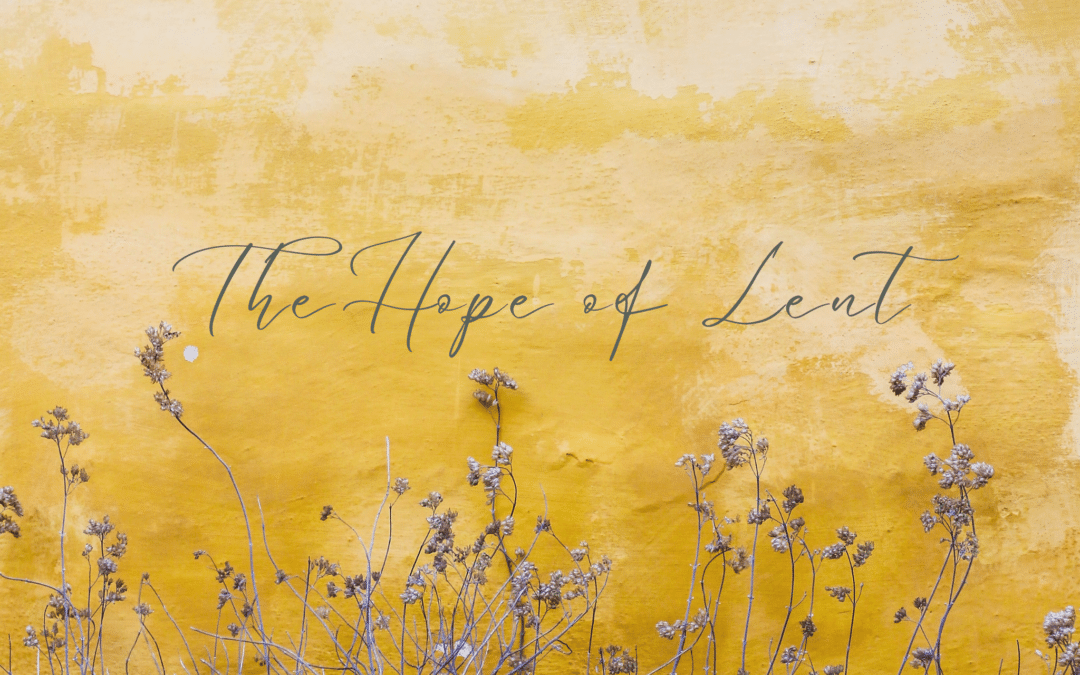
I love this time of year but not for the normal reasons. Lent, the 46 days leading up to Easter, is not a time of gift-giving or lavish partying. It’s not even a time for chocolate bunnies or Cadbury eggs—these don’t come until Easter morning. And the weather is typically dreary. Chilly and wet as winter tries to hang on in the tug-of-war that spring is eventually sure to win.
Lent is somber.
It’s a season for reflecting on the cross. A season to get better acquainted with the limitations of our humanity. To remember how much we need Jesus in the big things out of our control and in the smaller moments when our patience is simply fraying. It’s a time for pruning, for stripping away. The good news is that these are not ends in themselves. Lent is so that more fruit will eventually come to bear.
Twenty years ago, I sat in the office of a Christian counselor who guided me along the paths of Lent. He explained it was a time to set aside some of our normal pleasures so that something new could grow in its place. It was this “new thing growing” that caught my attention. I needed new. I was stuck. My friendships weren’t healthy, my work success or lack thereof was controlling my emotions, I didn’t know how to cultivate joy. Cutting something fun out of my life seemed a terrible idea rather than an antidote. But I agreed. Reluctantly.
I’ve never looked back.
That year I set aside some things that had held power over me. But I didn’t stop there. My counselor helped me fill that newly created space with intentional practices that focused on my relationship with Jesus. I paused longer to reflect in God’s Word, journaled, took prayer walks, talked to friends about what God was teaching me, showing me. As I did, the roots of my faith pushed deeper into richer soil. It’s dark down there, by the way. I didn’t enjoy every moment underground dealing with my attachments, my neediness, my sin. Some moments were agonizingly lonely. But God was doing a resurrection work the likes of which can only happen underneath the ground. Or behind an immoveable stone.
The other day I was talking to my friend about the cumulative effects of seasons of fasting. Each Lenten year seems to build on the next. She told me that some of the things that used to be so hard for her to lay down she doesn’t even think about anymore. Those time-consumers, those unyielding habits, she no longer has use for them. I get it. What makes this a double-win is practicing Lent not only helps us rid ourselves of the detrimental or unnecessary, but that time is redeemed for what matters. Life-giving practices now grow out of the same soil whose nutrients used to be spent on the frivolous. Lent helps us steward the soil God’s given us.
I’m reading through the back half of Mark as Easter approaches (Mark slows way down after Peter’s confession of Him in chapter 8. From there, it’s a slow walk to the cross). It keeps me intentionally focused on Jesus and His road to the cross and ultimately His resurrection. One of the most meaningful parts to me is when the disciples are arguing about who’s the greatest. We do this today, by the way—we just may not discuss it out loud and in plain daylight. Anyhow, Jesus sat down, which I assume meant He sat His disciples down too. “Anyone who wants to be first must be the very last, and the servant of all,” He said (Mark 9:35). I don’t think He could have laid it out there any clearer. To be great is to serve. To be high is to be humble. To be first is to put the needs of others ahead of our own. The Lenten season helps us practice this. As we die a little more to our comforts and addictions and obsessions, we make more room for Christ to pour His life through us.
We’re a little less than three weeks to Easter. The brunches, baskets, and bunnies will be there. In the meantime, what new thing needs to grow? Jesus, help us follow you as we walk toward Easter. Prune back what is sucking the nutrients out of us. Strip away what is not of you. Fill us with your Spirit. And on Easter morning, we will celebrate that you have made, and are making, all things new.
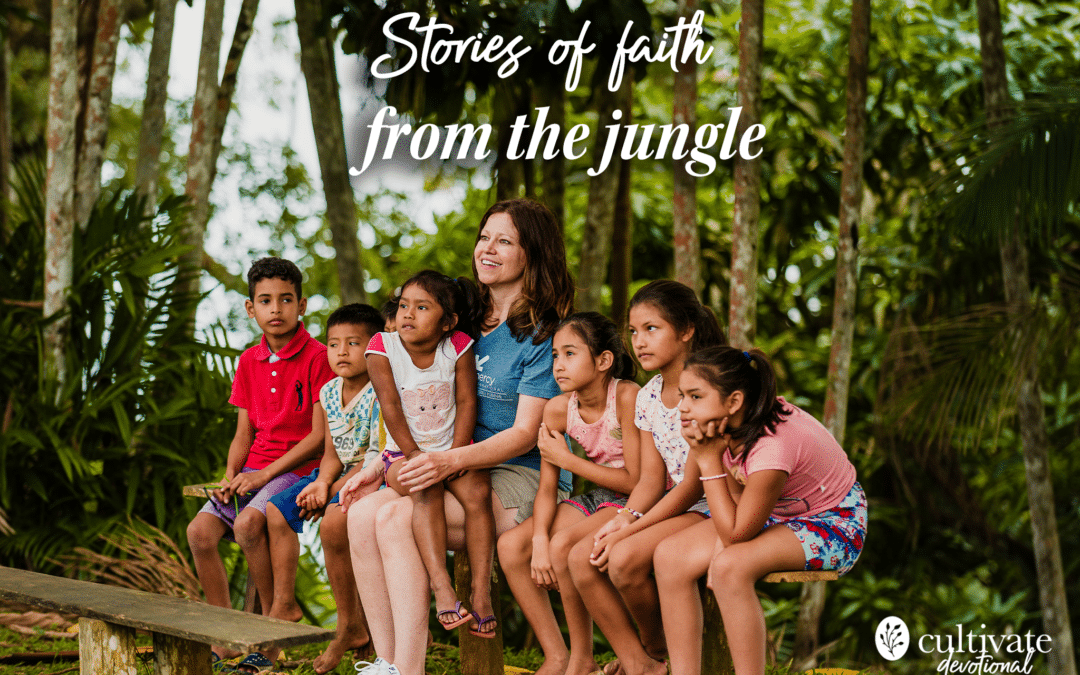
I just returned from the Amazon jungle where I taught at Justice & Mercy International’s Annual Jungle Pastors Conference. Ninety-four indigenous men and women gathered for a week of Bible teaching and renewal. Many traveled by boat and bus for several days to attend. This is my thirteenth year being a part of these conferences and I never return the same. I’ve been home for less than 48 hours, and while watching black howler monkeys swing from rainforest treetops while keeping an eye out for caiman seems a world away from my daily reality, the faith of these jungle pastors couldn’t be more relevant to my here and now. I have a feeling the same is true for you. If you could use a faith booster, read on.
I sat with my dear friends Cosme and Auria who serve in a village that floods annually. When I asked them why they chose to live in a community that floods every year, Cosme simply said, “Because there are lives there.” In other words, they go where people need to hear about Jesus’s love, not where it’s easy. How often do I factor in ease ahead of what people need when making a ministry decision? In addition to the geographically challenging location of their village, Cosme suffered a stroke a few months ago and has an enlarged heart. When I asked how he continues to serve with such joy, he explained that trials bring us closer to the Lord. It was a simple concept to him really—when we face crises, we get to know Jesus more. We also find out what He’s capable of accomplishing on our behalf. Cosme and Auria’s joy and hope were infectious. You and I can have the fullness of joy in Christ that transcends the trials we’re walking through.
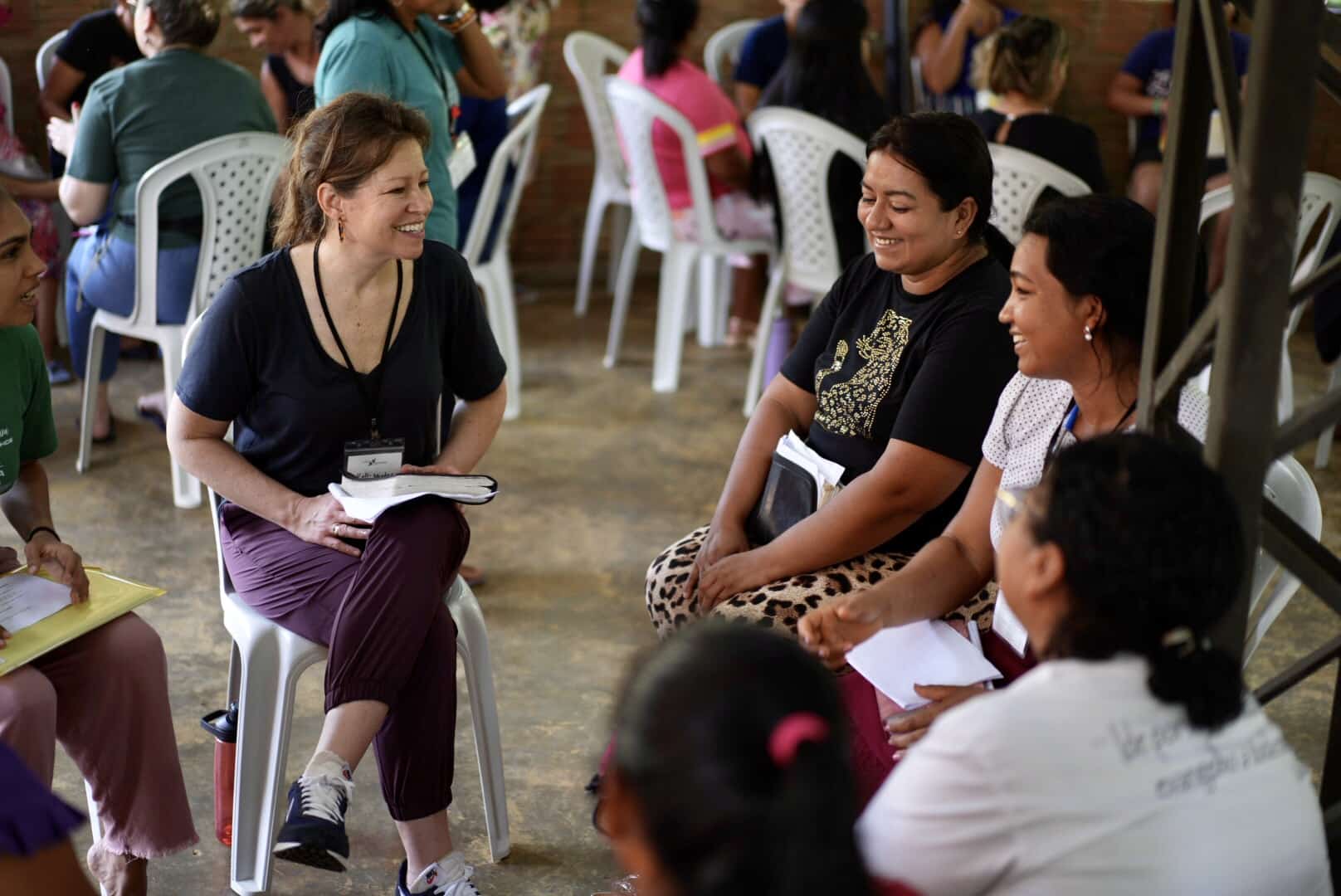
I visited with another pastor, Rildo (pronounced “Hildo”). He has a 29-year-old son who is non-verbal. As a result of his and his wife’s experience raising a child with special needs, he now has a ministry to countless special needs children in the Amazon. It’s staggering what he’s been able to accomplish with no income and a whole lot of God’s power. I wonder what God has taken you through personally and how He wants you to help and bless others as a result of what He’s done in your life?
In addition to Rildo’s ministry to children, he also started a church in an indigenous tribe. For three years, Rildo prayed for an opening in this tribe. (I have given up on certain prayers in three days!) Eventually, this tribe invited him in because they saw the love he and his family had to offer. The chief and leaders of the tribe signed documents for Rildo to minister inside the tribal community—a rare occurrence in the Amazon. What might God accomplish in our lives, and in the lives of those we love, if we prayed persistently and confidently with a passion to see God’s will done on this earth? Whatever it is you’re praying for, Pastor Rildo reminds us—don’t give up! The Lord delights to answer us. Sometimes prayer is a process.
I was further impacted by a couple whose names I will refrain from using to protect their identities. They minister in a village where incest and childhood sexual abuse are part of the culture. This couple is seeking to change the culture by bringing Jesus to this village. Already, their modest church building is at capacity. Each week they’re teaching over 40 children about Jesus and the Bible. They’re also teaching them about the sanctity of their bodies and how to protect themselves and ask for help if someone tries to take advantage of them. While abuse is illegal in this part of the Amazon, law enforcement does little to uphold the law, and abuse is rampant in families. This couple has received death threats because of the work they’re doing to protect children. Through tears, this pastor said, “I would rather be killed than let another little girl be abused.” After talking with them, I wondered what sacrifices I was making to bring Jesus to those around me.
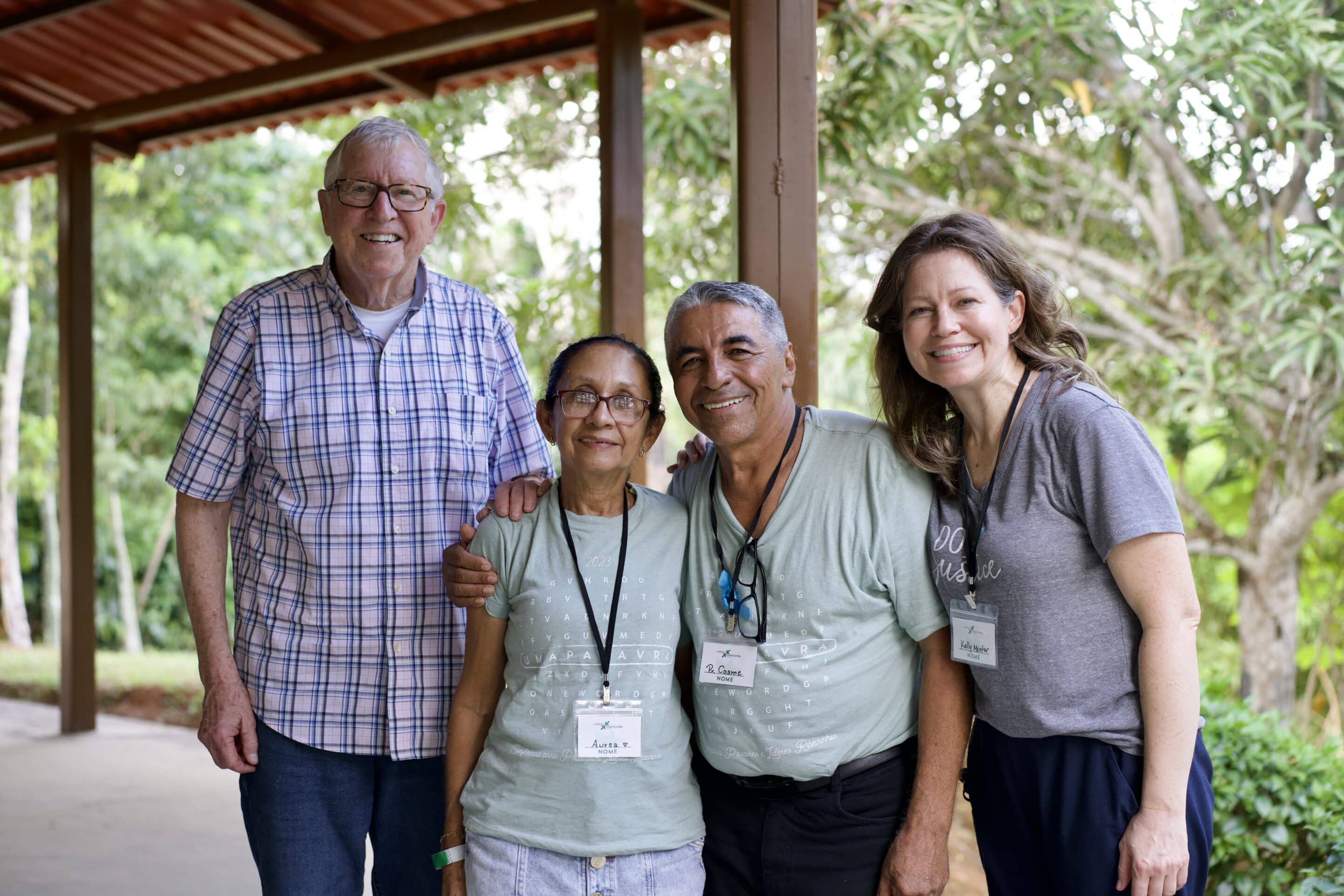
It’s tempting to think that these stories are confined to the jungle, but I don’t think that’s true. Powerful stories of redemption aren’t confined to a place, rather they’re attached to a faith. When we take Jesus at His Word, when we deny ourselves and obey Him, we see Him do exciting things in our lives, but we also get to know Him more deeply. Pastor Cosme said that when he faced trials as a new believer, he would tell the Lord, “I don’t know you that much, but you know me that much.” In other words, he may not have known Jesus all that well at the time, but Jesus knew him inside and out. This encouraged Cosme to rest in the Lord’s will for His life and trust Him in the middle of trials.
I don’t know how well you know the Lord, but He knows everything about you. Trust Him. Follow Him. Pray to Him. And watch Him do great and mighty things.
Instagram: @kelly_minter
Facebook: @KellyMinterAuthor
Click the button below to open in a new tab, then right-click on the image to download.
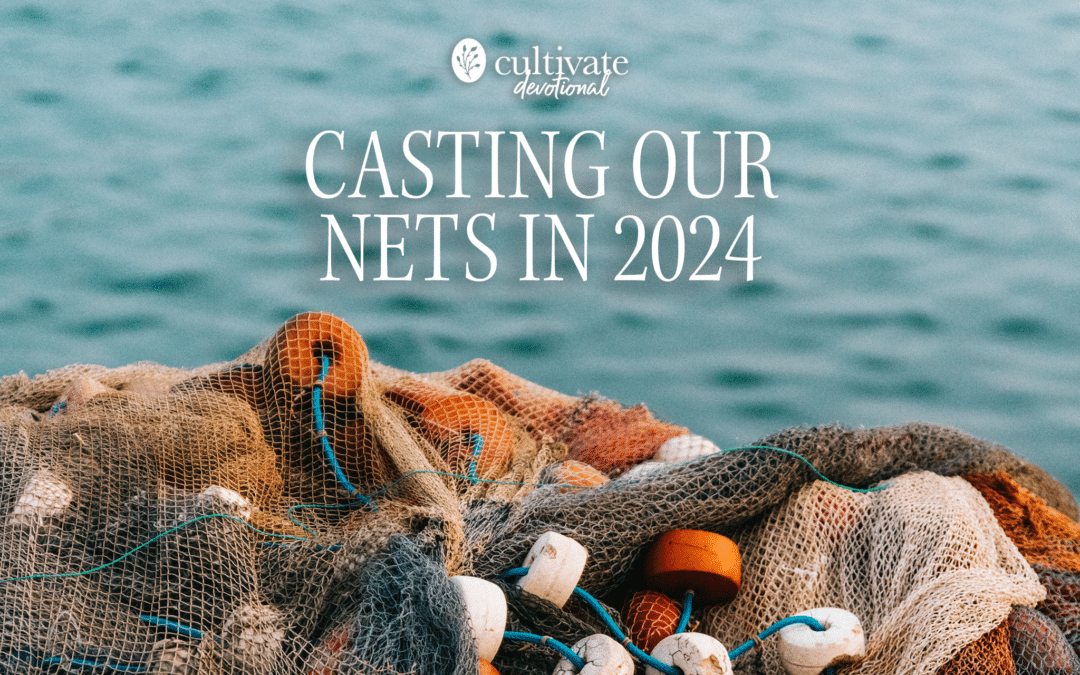
Happy New Year! I hope your year is off to a good start. Mine has been minorly shaky—I started the year with a bang-up sinus infection (my favorite involuntary sickness) and I had to throw away every single strand of Christmas lights due to a portion of each strand not lighting up. This is
discouraging since, after all, the only job a strand of lights has is to light up. I have decided the Christmas decorating companies are out to get us, programming each string of lights to last about half a season. They, of course, give us false hope with the spare bulbs per box which do not work
one-hundred percent of the time.
Have I wished you a Happy New Year yet?
One of the highlights for me in this early part of 2024 was seeing the familiar passage of Luke 5:1-11 with fresh eyes. I spoke briefly about it in an Instagram reel where I asked the question, are you willing for Jesus to reprioritize your 2024 plans? The video seemed to sparked some thought, so I thought I’d go deeper into it here. Before we get there, though, let me ask you: are your 2024 plans set in stone? Are your goals for the year fixed? Or are you available for Jesus to shuffle around your priorities?
Take a minute to read the following short account from Luke 5:1-11.
1 One day as Jesus was standing by the Lake of Gennesaret, the people were crowding around him and listening to the word of God. 2 He saw at the water’s edge two boats, left there by the fishermen, who were washing their nets. 3 He got into one of the boats, the one belonging to Simon, and asked him to put out a little from shore. Then he sat down and taught the people from the boat. 4 When he had finished speaking, he said to Simon, “Put out into deep water, and let down the nets for a catch.” 5 Simon answered, “Master, we’ve worked hard all night and haven’t caught anything. But because you say so, I will let down the nets.” 6 When they had done so, they caught such a large number of fish that their nets began to break. 7 So they signaled their partners in the other boat to come and help them, and they came and filled both boats so full that they began to sink. 8 When Simon Peter saw this, he fell at Jesus’ knees and said, “Go away from me, Lord; I am a sinful man!” 9 For he and all his companions were astonished at the catch of fish they had taken, 10 and so were James and John, the sons of Zebedee, Simon’s partners. Then Jesus said to Simon, “Don’t be afraid; from now on you will fish for people.” 11 So they pulled their boats up on shore, left everything and followed him.
Like me, you may be quite familiar with this story having read it many times before. But something hit me that I’d never thought of prior. Peter and his friends were fishermen, meaning this was their business. They hadn’t stayed up all night fishing because they needed some time
away from their wives and kids to shoot the breeze on a breezy night out. They had been up all night because their livelihood depended on it. Fishing was their job.
When Jesus tells Peter to let down his nets in a certain spot in the middle of the day, Peter is hesitant because what does a rabbinical teacher know about fishing. Peter, on the other hand, knows that on the Sea of Galilee fish feed at night, and he has already tried to catch them and failed. But Peter responds and does what Jesus tells Him. When he and his friends set out into the deep and let down their nets, their nets began tearing at the astounding haul of fish. Here’s the part I’d never thought of before, the part that scholar Kenneth Bailey in his book Jesus Through Middle Eastern Eyes so astutely brought out. You would think Peter would want to harness Jesus’s spectacular ability to know where the fish are. Think of the boom to his business! The windfall of sales at the fish market if Peter always knew where to catch them! Perhaps Peter wondered why Jesus wasn’t in business for Himself given His keen ability to harvest fortune out of a lake.
But Jesus’s priorities are different from Peter’s. “Peter faces a man who wins the ‘fishing lottery’ but doesn’t want it.”
In the moment on the water Peter recognizes that Jesus is no mere teacher. It’s probably too early for Peter to understand Him to be the Son of God, or the Messiah, but Peter gets that Jesus is holy and he is not. Instead of chastising Peter for his lack of faith—or trying to talk Peter into a business partnership where Jesus spots the fish and Peter brings them in and they become Galilee Gazilionaires—Jesus changes Peter’s value system. Instead of prioritizing fish that are brought in to die, Peter will from here on out look for people to bring to life in Christ.
Yes, Jesus could aid Peter in the biggest, most profitable year of his career, but that wasn’t why Jesus came. And it wasn’t Peter’s highest calling. Nor is it ours.
Peter encountered Jesus in a space of earthy stuff like water, wood, nets, knives, and swimming things to show Peter the high value of eternal things. Things like souls. As we sit atop a new year, are you willing, if needed, for Jesus to bring some of your top priorities lower and your lower priorities to a place of prominence?
My prayer for you and me is that Jesus will meet us in our everyday spaces—like He did Peter—to show us what truly matters. That we might be reminded anew that He is not just teacher, but Lord. And that we are not just workers but disciples who serve at the pleasure of our Savior. What a year this stands to be if we will allow His priorities to become ours.
Happy New Year!
[1] Jesus Through Middle Eastern Eyes: Cultural Studies In The Gospels, page 146
*Download the graphic below to share on your socials, and don’t forget to tag us!
Instagram: @kelly_minter
Facebook: @KellyMinterAuthor
Click the button below to open in a new tab, then right-click on the image to download.

I want to wish you a very Merry Christmas and a blessed holiday season! As we’re marching straight toward this most anticipated holiday, I know there’s probably a lot of stress mixed in there with the excitement. Instead of bringing you a written devotional this month, I wanted to share a video of encouragement straight from the Gospel of Luke. I hope these tips from Mary and Elizabeth encourage you as you prepare for your Christmas, whatever it looks like. Overall, I just want to remind everyone to take a step back and remember what this season is truly about – the birth of Jesus! What a reason that is to celebrate!

The holiday season is upon us and so are all the impossible expectations. (Is this too Grinch-ish for the beginning of a devotional?) During this season our joys and sorrows are magnified. Not to mention, Thanksgiving, Christmas, and New Year’s each bring with them a frenzy of activity, an assortment of relatives, and often complicated situations. This is not to dismiss the season’s sentimental qualities or potential for cherished memories to be made. But for most of us, the holidays are a mixed bag and it’s important to decide at the top how we’re going to approach them. We have a choice to either succumb to cultural expectations or determine to put our expectation and hope in Christ, no matter our circumstances.
This time of year, I like to revisit Elizabeth’s story in Luke 1. Elizabeth was too old to bear children and was barren on top of her age. Imagine her immeasurable joy when after years of what she would refer to as her “disgrace among the people,” the angel Gabriel announced that Elizabeth would soon become pregnant with a son. And while any son would have been a blessing, John the Baptist would be the forerunner of the Messiah. Elizabeth and her husband Zechariah would bring into the world one of the most important figures in Christendom.
At the peak of Elizabeth’s glory, a much younger and arguably less deserving woman stepped through the front door bearing a child greater than Elizabeth’s. Her name was Mary and was already pregnant with Jesus, the Christ. If Elizabeth had been given to comparisons and holiday ideals, her expectations would have been dashed before the first Christmas had even come. But Elizabeth wasn’t caught up in comparisons or jealousy.
Her focus was on Jesus and His presence with her: "How could this happen to me, that the mother of my Lord should come to me?" (Luke 1:43.), she exclaimed! Her words reveal a secret we desperately need this time of year: Elizabeth’s hope was not in an ideal but in a person, the person of Jesus.
Where are your hopes this holiday season? Are they in achieving the perfect Thanksgiving table or Christmas gathering? Are they in who will be at your house or at whose house you will be? Are your hopes rising and falling on your finances or health or job to pull off a “good Christmas?” These are all important questions and they matter deeply to the heart of Christ. You matter to Him, and He knows how much we all long to be with loved ones and have a joyful season of celebration. But, ultimately, our hope must be in Jesus.
He must be the longing of our hearts. I read this morning in Ephesians Paul’s prayer for us to know Christ’s love that surpasses knowledge so we can be filled with all the fullness of God. Both Mary and Elizabeth experienced the fulness of Christ’s love despite their circumstances. I am deciding today that Jesus will be my hope and focus this season. As a result, I am always a much more delightful person to be around—when I’m giving out of what He has given to me.
This season, let’s not mistake the holiday ideal for our Savior, Jesus Christ.
*Download the graphic below to share on your socials, and don’t forget to tag us!
Instagram: @kelly_minter
Facebook: @KellyMinterAuthor
Click the button below to open in a new tab, then right-click on the image to download.

“Blessed are the poor in spirit, for the kingdom of heaven is theirs.” Matthew 5:3
Sometimes when I’m really out of sorts, my friends will remind me of how truly blessed I am, how much I have to be thankful for. But this always feels like an evasion to me, like they’re not giving my “pain and suffering” its due. They’re looking for what is going well in my life, doing the math, and then deciding I’ve got more going for me in the blessed column than in the poor in spirit one, so blessed it is.
I don’t know how the word blessed hit Jesus’s disciples on the hillside that day or how it landed on the crowds, but I can’t imagine it was the first word the sick, lame, shunned, or hungry expected to hear Him speak to them that day. And Jesus wasn’t using the word to convince them that the good things in their life outweighed the bad, that they were more blessed than not. He was declaring those in His kingdom as wholesale flourishing.
Blessed.
Think of that word hanging out there over a Jewish people hobbling under Roman oppression. The ones who for centuries had been pining for a powerful Messiah in the image of King David to knock their enemies out of the land. Surely some had followed Jesus out of curiosity but most out of pure desperation. Some were longing for a new leader who could help them figure out how to get back on the God of Israel’s good side, someone with a solid campaign slogan. Some may have showed up hoping to hear a strategic and gutsy military plan: Who’s ready to defeat Rome once and for all? Strap on your swords! Others may have been looking for something more personal and close to home, like a much needed healing or handout.
Blessed.
The word itself is not an unusual opener. It’s only shocking when you think about whom He addressed it to: the poor in spirit, mourners, stomped on, hungry, innocent, persecuted. Well, now, this just feels like madness. How can the poor in spirit be the blessed ones? In what kind of a world, in what kind of a kingdom, in what kind of a religion, has this ever been so?
Before we consider an answer, it is worth asking, Why are you here? Why have you come to listen to the words of Jesus?
Are you looking for Him to overpower someone who has wounded you? Is a family member sick and in need of healing? Are finances tight? Is work unfulfilling? Is your marriage suffering? Are you simply tired of the grind, like the average Jewish peasant in first-century Galilee looking for a sustaining word of encouragement, a change in the political land
scape? Perhaps you’re not looking for anything from Him as much as you simply want to be with Him and listen to what He has to say. Note that the “them” Jesus begins to teach in verse 2 appear to be His disciples. But at the end of His message, it was the crowds who were astonished at His teaching (Matt. 7:28). We should establish at the outset that both disciples and undecideds are invited to listen. Whichever you are, I’m glad you’re here.
But back to our question. How can people like the poor in spirit be blessed? In the original language, the word for “blessed” is makarios, and it means “prospering, fortunate, flourishing,” and in some cases, “downright happy.” (This is different from the word used when someone pronounces a blessing on another, translated eulogeo). Makarios is a description of the state of a person who is thriving in the kingdom of God. So Jesus isn’t saying that the poor in spirit will eventually gain a blessing. He is saying that their current state of being is a prosperous one because God’s kingdom is theirs. In fact, in every case of the nine Beatitudes, a difficult state of being is paired with a promise of blessing.
So if you’re struggling or hurting today, may Jesus redefine your circumstances as only He can. If you find yourself poor in spirit, malnourished by the “blessings” of our culture, you’re in prime position to experience the blessed life of the kingdom.
Ask Him to teach you and show you what it means to flourish in whatever your circumstances. Look for Him to answer you as you go about Your day. He is eager to meet you in it.
*Download the graphic below to share on your socials, and don’t forget to tag us!
Instagram: @kelly_minter
Facebook: @KellyMinterAuthor
Click the button below to open in a new tab, then right-click on the image to download.

I remember loneliness well. It settled in like a long fog. Everywhere I moved, it was there. I had lost my tightly knit community for varying reasons—in the end, it was for one reason in particular: my friends and I were moving in opposite directions. The eventual separation didn’t happen overnight, it dissolved slowly like a patch of snow on a sunny day hanging on in the shade. There were good reasons for what turned out to be a lengthy loneliness, and my intimate knowledge of Christ deepened significantly, but that didn’t make the isolation any less awful. It was one of the saddest and hardest times of my life.
Looking back, I can see a spotty trail of lily pads that stretched between the riverbank of loneliness on one side and that of new and dear friendships on the other. Those lily pads were people or groups of people. Most of them unassuming Christ-followers who loved me in ordinary yet potent ways. A Saturday morning Bible study at a downtown Nashville coffee shop, a family I had dinners with while commuting to a church in Florida to lead worship, an occasional coffee with someone who knew how to listen well, and many others. Each was a temporary landing pad that helped me make my way from one side to the other. It’s just that at the time I wasn’t sure there was another side. All I knew was that after each interaction I had enough hope in the tank to keep going.
These memories spring from nearly two decades ago. Life has changed considerably for me. But I share them because the more I keep my eyes keen and ears attuned to my surroundings, the more I am aware of how many are living isolated and lonely lives—even the ones who appear social, those out on the block small-talking with the neighbors while the big questions and crises of their lives remain hidden. This is not to mention those who don’t come out at all. Or the elderly in assisted living with few or none to visit them, or the agile and mobile equally isolated because they’re glued to their phones, addicted to interaction without actual relationship. No matter the
reasons, we are a lonely society.
I will never get over how John, one of Jesus’s closest disciples, began his first letter.
“That which was from the beginning, which we have heard, which we have seen with our eyes, which we have looked at and our hands have touched—this we proclaim concerning the Word of life. The life appeared; we have seen it and testify to it, and we proclaim to you the eternal life, which was with the Father and has appeared to us. We proclaim to you what we have seen and heard, so that you also may have fellowship with us; and indeed our fellowship is with the Father and with his Son Jesus Christ.” (1 John 1:1-3)
One of John’s primary reasons for writing was to reveal the dynamic fellowship we can have with Jesus and how that relationship leads to a whole community of relationships. One of the fundamental aspects of the Christian faith is that we are not to be alone! I hope you hear John’s passion for you. If you are lonely, you are invited into a fellowship with Christ that is dynamic and personal and you are invited into the fellowship of believers. John was getting at the dual nature of Christian fellowship—get to know Jesus and get to know us; get to know us and get to know Jesus! (Not that Christ and His disciples are one in the same, rather our fellowship with the Lord feeds our fellowship with others and vice-versa.)
However, two challenges immediately stand out. How many struggle to think about God on a personal level because their own father was cruel. It is not always easy to experience Christ in an intimate way, to have this fellowship with Him. Obstinate and formidable barriers exist. This is where the fellowship of the church comes in. By reflecting the sacrificial love and visceral compassion of Christ, like John and the rest of the disciples did, we demonstrate God’s goodness to those who have difficulty receiving it.
But this necessarily leads us to the second challenge: the church community—the fellowship of believers John speaks of—doesn’t always act the way we are supposed to. As many struggle to experience a loving God, just as many lament that for them the church community is equally freighted with baggage: betrayal, hypocrisy, gossip, abuse, power-struggles… These are real obstacles we cannot deny.
At the same time, their very existence should further compel us to be safe and broad lily pads for those who cross our paths. Temporary landing spots for some, and longer places of respite for others. We cannot fix a person’s view of God but we can reflect Him in loving clarity because we ourselves are being changed and renewed in His presence. In John’s terms, because we have fellowship with Him. We, equally, cannot solve the problems of the church at large, but we can be a difference maker in our own local churches. If the friends and acquaintances I met during my stretch of loneliness had abandoned the church for all its issues, who knows what waters I would have plunged into. I thank God for them.
If you have a hard time appropriating Christ’s love for you because of past wounds, or if the idea of being part of a church brings up equal distress, may a genuine Christ-follower be in reach. And if you have you experienced the Word of Life, do not keep Him to yourself. The lonely are all around you. Spread your lily pad wide. Who knows who might land in your way?
*Download the graphic below to share on your socials, and don’t forget to tag us!
Instagram: @kelly_minter
Facebook: @KellyMinterAuthor
Click the button below to open in a new tab, then right-click on the image to download.